Undiscovered Portugal – Holiday Home in scenic Northern Mountains
get away from it all: walking, swimming, fishing, riding or just relaxing in the sun
|
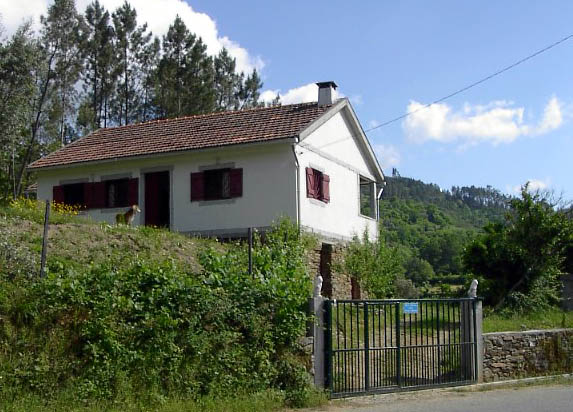 Villa Adriano, Ponte Cabaços Villa Adriano, Ponte Cabaços
nr. Reriz, Beira Alta, Portugal
The Paiva valley
“A mais desconhecida de todas as serras.” – ‘The most undiscovered of all the mountain ranges’ – so begins the best guide-book to Portugal when describing our area. It is a region of high granite mountains which, like the highlands of Scotland, are covered in a scrub of gorse, heather and broom. The mountain sides are clothed in pine forest and are intersected with ancient paths climbing up from hidden valley floors through which swift-flowing clear rivers run and the warm-weather crops of grapes and olives are cultivated.
|
|
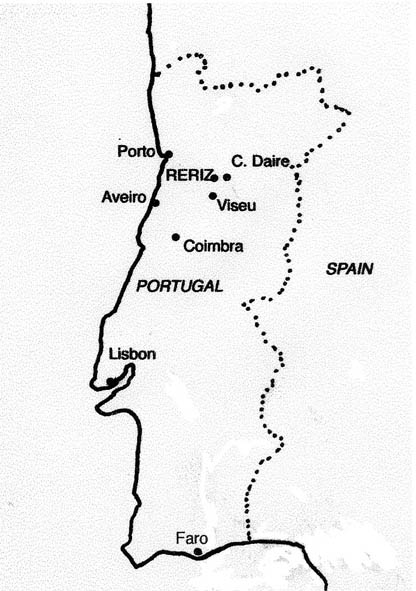 2024 2024
Reriz is well placed for most of Northern Portugal with fast roads being opened all the time with the new motorway exit now only 10km away. Aprox. driving times: Aveiro (1 hour plus), Porto (1 +half hours plus), Coimbra (1 +half hours plus), Lisbon (3 hours plus).
|
The Paiva valley is more or less midway between Porto and Coimbra and about 40 miles inland (if you could go directly). If you fly, you would normally go to Porto which is about an hour's and half drive up the motorway, or about three hours' drive from Lisbon. Reriz is 380 miles from Santander by road which is an easy day's run.
|
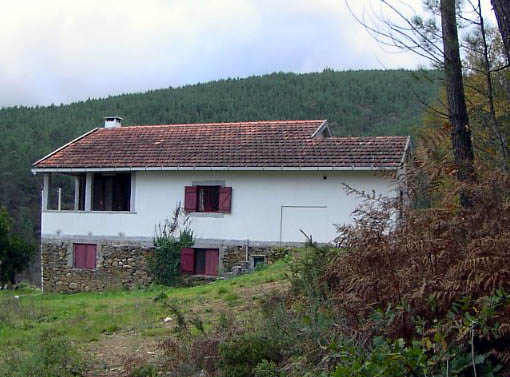 The House The House
We have restored an old shepherd's cottage in a most romantic
position overlooking a ruined bridge on a bend of the river
Paiva. The views are notable, as it lies at the bottom of
a steep valley. On one side are the lower slopes of Montemuro
which rises to a majestic 1382 metres (4,500'). There is only
one other house nearby, a restored mill house, out of sight below
the bridge, otherwise the nearest neighbours are about half a
mile further up the valley. It is about about a further half-mile
to the village of Reriz which has shops, a cafe and pubs.
On the other side of the valley fields rise up a steep hillside,
covered with pine forest up to São Macario which
is itself over 1000 metres. As the river Paiva winds westwards
there is a ruined bridge where shepherds are often to be seen
watering their flocks, much reminiscent of a classical landscape
by Claude Lorraine. In the widest part of the valley, the house
is bathed in sunshine virtually all day, but it has been designed
to keep cool in Summer, with its thick walls, high ceiling and well insulated
roof. The main room is floored with granite and the others in
tiles for ease of maintenance and to keep cool.
Apart from its beautiful position, only slightly spoilt by
the modern concrete bridge, the chief asset of the house is that
it is only some fifty yards from the river which has one of the
best bathing pools in northern Portugal. Its steep rocks form
natural diving boards and sandy 'beaches' for tinies. While this
can attract locals in high summer, they rarely appear before
the afternoon. As the afternoon water temperature in the summer
is around 20°C it provides much safer and more comfortable
bathing than the sea whose nearest point is at Aveiro some 80km
away. This particular spot is often used for 'outward-bound'
activities of canoeing, rock climbing and abseiling. With the
river so close, there is no need of a swimming pool and the land
of about 3 hectares has fruit and ornamental trees.
|
|
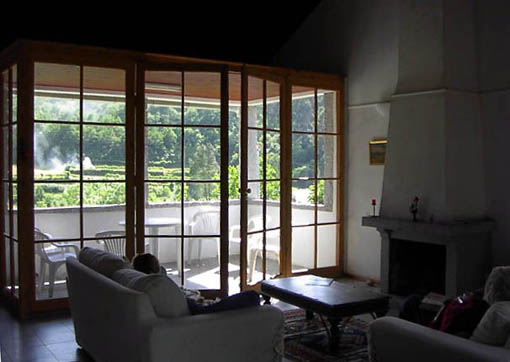 Accommodation Accommodation
The house is designed for six people and includes a large
open-plan living room with a kitchen and dining area at
one end. The room has been re-constructed with a granite floor
and fireplace and an integral balcony looking down the valley.
Two double bedrooms on the ground floor (the old stone
stables) each with two single beds. There is a separate shower
room with WC and basin. The main bedroom is next to the
living room and has a double bed and a shower room/WC. Utility
rooms with fridge-freezer and washing machine.
The living room and balcony
|
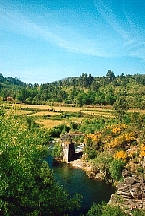 Looking down the
valley with its ruined bridge on the river Paiva.
Looking down the
valley with its ruined bridge on the river Paiva.
Leisure
Life in the Portuguese villages is changing rapidly as the
twentieth century catches up with this remote outpost of the European
Union. But much of the traditional life of the small peasant farmer
remains centred on his self-sufficient small holding, growing
crops all the year round. The local speciality in the handicraft
line is making baskets and the markets still sell the pottery,
tin-ware and tools of the agricultural community as well as a
lot of modern 'tat'. Mixed flocks of sheep and goats are a frequent
sight at the the river but few of the traditional cow-carts are
still in use.
There are few leisure activities laid on in the valley, but as well as the swimming, for those who like walking, there are splendid walks through the pine forests. Nature is abundant: São Macario is part of the 'national park of forest and flowers' and, as well as rare species of plants, boasts spectacular insects (though happily very few mosquitoes). The river Paiva is noted for its fishing for trout and barbel.
The nearest tennis courts are at the Termas de Carvalhal which is about 10kms away on the Viseu road. There is even now a golf course outside Viseu (c.45kms). The nearest clubs etc for the young are at the Termas de São Pedro do Sul which is some 25kms away along the next valley. But in general you need to make your own entertainment.
Touring: with the vast improvement to the Portuguese road network over the past few years, the Paiva valley becomes a better and better centre for exploring those parts of Portugal which are not on the beaten tourist route. A new road links the local town of Castro Daire with the Douro valley making the journey to Regua with its port lodges about half an hour away. In addition there is a new road from the nearest city of Viseu, in itself well worth a visit, that has brought Fatima and Coimbra within about two hours from Reriz. Even Lisbon is now only about three hours drive including the historic towns north of the city such as Batalha, Alcobaça and Nazaré.
Weather: Northern Portugal has a 'mediterranean' climate, modifed by being on the Atlantic. Thus summers are normally hot rising to 30°C in July and August, but as the house is in the mountains, it would normally fall to a cool 15°C at night. Often little or no rain falls in the summer, but winter is usually very wet. In spring and autumn it is hot when the sun is out and indeed we have breakfasted outside in January but it can also be showery and cool. Thus we only normally let the house in the ‘good’ season from April to September.
Shops and other facilities: the nearest shops are at Reriz which has a general store, a restaurant and several cafés. The local town of Castro Daire has a multiplicity of restaurants and nearly everything one might need. Failing that, Viseu is the provincial capital complete with modern hypermarkets.
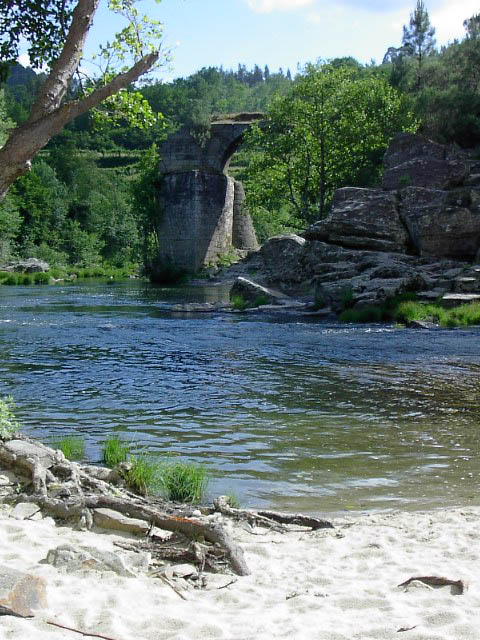
The pool in the river Paiva below the house
PRICES in 2024
| before July 17 |
17 July – 11 September |
after 11 September |
| €425 |
€825 |
€425 |
The above prices are in euros (€) per week but you are welcome to pay the equivalent amount in pounds (£) stering. This is for the whole house and includes clean linen on arrival, electricity and fuel for cooking.
If you would like further information contact us. If there is no answer to the telephone, use email as we are probably in Portugal.
To book, please fill in the Online form.
Mrs Phillips
Teddington House, Warminster, Wilts BA12 8PQ, England
Tel: +44 (0) 1985 213409
e-mail: adrian@villa-adriano.co.uk
 Villa Adriano, Ponte Cabaços
Villa Adriano, Ponte Cabaços 2024
2024 The House
The House Accommodation
Accommodation Looking down the
valley with its ruined bridge on the river Paiva.
Looking down the
valley with its ruined bridge on the river Paiva.